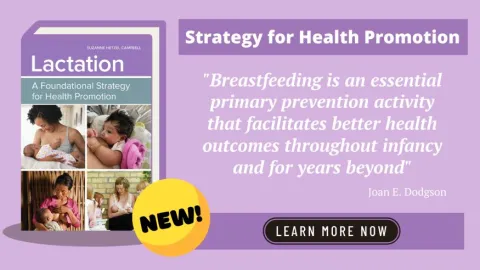UBC expert launches resource to improve breastfeeding in Canada

In Canada, parents who are considering breastfeeding have only limited complete support systems. Few hospitals or community clinics have full-time lactation consultants, and education about lactation for healthcare professionals is either inconsistent or lacking.
A new book published today hopes to help close this gap. Edited by UBC lactation expert and nursing associate professor Dr. Suzanne Hetzel Campbell, Lactation: A Foundational Strategy for Health Promotion provides an integrated resource for healthcare professionals and public health officials working on educating the public on the health and economic benefits of breastfeeding.
In this Q&A, she talks about how the book came to be and how it can support families' breastfeeding journeys.
Why this book, and why now?
Suzanne Hetzel Campbell: Breastfeeding provides physical and emotional health for parents and infants. Breastmilk is a renewable food, it is environmentally safe, doesn’t require packaging and does not produce waste. Exclusive breastfeeding during the first six months of life has the largest impact on protecting against infant mortality and children’s diseases, and offers protection against chronic disease later in life.
And yet, while there are many “how-to” books on breastfeeding for parents and healthcare professionals, there are few that provide a broader public health perspective on the importance of lactation in health promotion. By that I mean advocating for positive practices that promote health as opposed to treating problems after they have started to occur.
This is an important perspective to have if healthcare professionals and administrators and public health policymakers are to provide respectful, effective, patient-centred care.
In the book, you also talk about breastfeeding inequity.
Campbell: My co-authors and I took a special interest in the question of equitable care, pointing out some of the sociocultural factors and theoretical frameworks that healthcare providers should consider so that they can support families in their goals for infant-feeding. For example, poverty and race or ethnicity can often determine whether a parent chooses or is able to breastfeed.
I wrote five of the 15 chapters of this book, but I’m very honoured that some of the world’s leading experts in health and lactation have joined the effort and authored selected chapters. They help to provide that multidisciplinary lens.
Why is breastfeeding so emotionally charged?
Campbell: It is among the top 10 “taboo topics” for new parents, largely because successful breastfeeding can often be seen as a badge of “good parenthood”. Our book takes the perspective that healthcare providers need to identify and support parents’ goals around infant-feeding. It is not about making people feel guilty, rather it is about giving them confidence in their ability to meet their infants’ needs.
Where can parents go for more information on breastfeeding? Particularly in light of COVID-19?
Campbell: The data on lactation and COVID-19 is coming in daily and I would urge parents to keep up-to-date, consult with their healthcare professional and weigh the risks and benefits for them in their specific situation. I would also encourage new parents to check the latest information from the BC CDC and Baby-Friendly Initiative in Canada. It’s also useful to consider the latest statement from the Academy of Breastfeeding Medicine.
We do know that pregnant and lactating parents are having a harder time getting support, as there is less access to breastfeeding prenatal classes, support groups and clinic visits. Creative telehealth options like a three-session virtual prenatal breastfeeding discussion group for parents developed by the BC Lactation Consultants Association and online support groups are becoming more popular.
How can healthcare professionals better support families through this process?
Campbell: Concrete support can be found by incorporating the Baby-Friendly Initiative’s 10 steps for breastfeeding, which includes prenatal, in-hospital and post-delivery support for new parents. Healthcare professionals can also take advantage of learning opportunities in their health authorities and programs like those developed by the UBC Faculty of Medicine and my research team Open educational resources.
Maintaining a level of curiosity, openness to learning from our patients and colleagues and recognizing what we don’t know are valuable attitudes for us all.
Finally, as health professionals we should recognize breastfeeding as an intimate interaction and be sensitive to providing privacy and alertness to histories of trauma and violence that may impact new parents' experience.
What role do you see for policymakers or administrators?
Campbell: As someone who has been passionate to support families to meet their infant feeding goals, and to provide interprofessional education for healthcare providers to be competent in this support, I have come to value the importance of grassroots coalitions, parental groups, healthcare professionals and government stakeholders. Working together, we can renew breastfeeding’s place as a foundation of public health and avert the falling percentages of exclusive breastfeeding. Our individual, family and community health, our economic stability and planet sustainability require that we don’t allow breastfeeding to become an endangered practice.
More information about the book and its authors: Words from Authors: Lactation: A Foundational Strategy for Health Promotion
To arrange media interviews with Dr. Campbell, contact lou.bosshart@ubc.ca.
To buy the book: Publisher, Amazon


